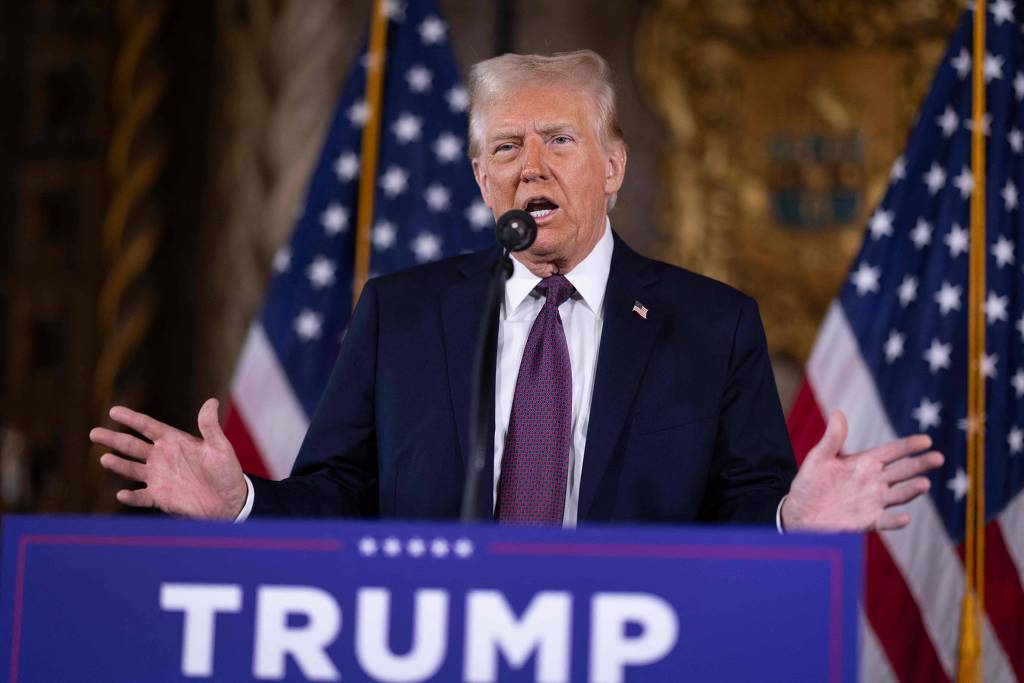
Published 01/08/2025 11:49 | Edited 01/08/2025 15:30
On the eve of returning to the White House, the president-elect of the United States, Donald Trump, escalated his colonialist rhetoric against Canada, Mexico, Gaza, Greenland and Panama at a press conference held this Tuesday (7) in Mar-a-Lago , in Florida. The Republican stated that he intends to use US military and economic strength to achieve his goals.
At the end of the day, Trump published a map of the USA on his social networks that included Canadian territory, intensifying diplomatic tensions in North America.
“If Canada merged with the US, there would be no tariffs, taxes would go down a lot, and they would be completely safe from the threat of Russian and Chinese ships that constantly surround them,” Trump threatened. “We are spending hundreds of billions of dollars a year to protect them. We are spending hundreds of billions of dollars a year to take care of Canada.”
Trump denied using military force to annex his northern neighbor, but said pressure to make Canada the 51st American state would come from economic measures.
After the press conference, the Associated Press stated that Trump has spent more time worrying about an “imperialist agenda” than about the United States’ internal problems since being elected. Reuters stated that the “America First” ideal, defended by the president, is expansionist.
“Canada and the US, that would be really incredible,” Trump said. “We get rid of this artificially drawn line, it would be much better for national security.”
Canadian Prime Minister Justin Trudeau countered Trump’s statements using his social media: “Canada will never, ever be part of the United States,” said Trudeau.
The prime minister said he recognized the value of the commercial partnership between the two countries, but rejected any possibility of annexation, denouncing Trump’s threats as “absurd and irresponsible”.
There isn’t a snowball’s chance in hell that Canada would become part of the United States.
Workers and communities in both our countries benefit from being each other’s biggest trading and security partner.
— Justin Trudeau (@JustinTrudeau) January 7, 2025
“There is no chance of Canada becoming part of the United States. Workers and communities in both countries benefit from being each other’s largest trade and security partners,” said Trudeau.
Canadian Foreign Minister Mélanie Joly also rejected the Republican’s statements, stating that Canada “will never back down in the face of threats”.
Trump has been escalating his statements against neighboring countries. Days after winning the elections, he said he will sign a decree imposing a 25% tariff on all products from Mexico and Canada that enter the United States.
At this Tuesday’s press conference, the billionaire once again justified the increase in tariffs on Mexican products due to an alleged increase in the flow of drugs and irregular migration.
This time, Trump suggested that the Gulf of Mexico be renamed the “Gulf of America.” The Gulf of Mexico is the largest gulf in the world. The region has a surface area of approximately 1.55 million km² and its subsoil is rich in oil. The area is also an important commercial and fishing route. In addition to the USA, the gulf borders Mexico and Cuba.
The name “Gulf of Mexico” has been used for more than 400 years by European navigators, who colonized the region. Now, Trump says he wants to change the name of the region to the “Gulf of America.”
“We’re going to change it because we do most of the work there and it’s ours,” Trump said. “It’s appropriate, and Mexico has to stop allowing millions of people to invade our country.”
The president-elect’s threats extended beyond the continent. He again suggested purchasing Greenland from Denmark, threatening to impose “very high” tariffs if the country did not give in. Trump also insinuated that control of the Panama Canal should return to US hands, in a direct attack on the historic treaty negotiated by Jimmy Carter in the 1970s.
He stated, without providing evidence, that China was operating the canal, which would justify American intervention.
The diplomatic crisis generated by Trump’s statements not only puts the continent’s trade relations into question, but also points to a scenario where North America’s stability will be tested by confrontational agendas and ultranationalist rhetoric. It remains to be seen whether the international community will react in a way to contain such advances or whether it will be drawn into a new cycle of tensions and disputes over territories that, in the 21st century, should be governed by dialogue and mutual respect between sovereign nations.
Source: vermelho.org.br

